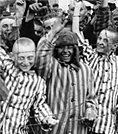 |

|
Transcript
"It
was filth, and lice, and smell, and death around
you, and you just waited for the end of the war
really, that is what we were doing. One day we
were standing, standing, and no Germans came,
and then we found out that all the Germans had
gone. A couple of days or so later the British
came. The tanks started rolling down the…
sort of like a main road, but I was so weak I
couldn't even go to greet them; most of us couldn't
go to greet them, because we were so weak and
tired. I was so pleased I could just lie down
and sleep. We were always imagining that when
we are liberated we are going to be dancing, and
kissing them - and I don't think they wanted to
be kissed by us to be honest! We didn't think
of it that way, we didn't think we were so dreadful
you know, but to them we looked absolutely awful
of course. And we're going to embrace them, and…
be happy, and dance, and God knows what, but all
we wanted to do was to lie down and be allowed
to be ill.
But I must say it was absolutely marvellous. We
got… they came with great big tankers of
water; that's what we needed more than anything
was good water. Food. Luckily, I think it was
more luck than sense, they gave us the right sort
of food. My very first food was tinned creamed
macaroni, you know the one in the tins, and that
was heaven. And every day on liberation day I
feed my family this tinned macaroni, the poor
things got to eat it! But you know, a friend of
ours who used to be with us when we were marching,
we used to share everything, and then she got
this food, this packet of sugar, she just sat
there and ate this whole packet of sugar, and
other things that the soldier gave her, and she
died. The British got these carts with Germans
inside them; they had to pick up the bodies and
then sit on top of the bodies, go a little further,
get off, pick up some more bodies, get on top
of these bodies you know. And that's a wonderful
wonderful sight, to see these Germans that I knew
were so horrible and so sadistic, sitting on top
of these bodies, having to pick them up. I wasn't
feeling vindictive; I could have taken stones
and thrown, some people did. I never threw a stone
at them or anything, I didn't… didn't want
to lower myself to that."
|
 |
 |
 |